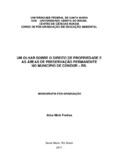| dc.contributor.advisor | Link, Dionisio | |
| dc.creator | Freitas, Alice Molz | |
| dc.date.accessioned | 2019-04-03T12:35:21Z | |
| dc.date.available | 2019-04-03T12:35:21Z | |
| dc.date.issued | 2011-07-29 | |
| dc.date.submitted | 2011 | |
| dc.identifier.uri | http://repositorio.ufsm.br/handle/1/16047 | |
| dc.description | Monografia (especialização) - Universidade Federal de Santa Maria, Centro de Ciências Rurais, Curso de Especialização em Educação Ambiental, EaD, RS, 2011. | por |
| dc.description.abstract | This study has as main objective to analyze the environmental and social
implications related to the right of small property and the application of the Law of
the Brazilian Forest Code, regarding to the APP's. Is justified by the environmental
and social relevance, through the search for the right balance between the public
interest in environmental preservation and the particular in exercising their right to
property. The APP's need to be preserved, but the small producer also need to have
decent conditions of living and to produce on their property. To verify that in practice,
a field was conducted in two rural towns from the municipality of Condor, RS, which
allowed to open paths in understanding this complex issue. The work is based on
bibliographic research, virtual, interviews and field. Some of the data obtained are
surprising, as the small area of land with presence of large water sources, index to
the inappropriate use of the areas of APP's. The implications on family income on
the application of the Law of APP's on the property and the lack of knowledge about
the environmental legislation. The results obtained in this research have brought
benefits for reflection and necessary changes to the small producer, environmental
education and other segments of society. Focusing on leveraging a new culture and
matrix production that protects the environment, produces income, and thus, bring
environmental, economic and social benefits, that is, the agricultural sustainability in
small property and the balance between the two rights guaranteed by the FA – Brazilian Federal Constitution. | eng |
| dc.language | por | por |
| dc.publisher | Universidade Federal de Santa Maria | por |
| dc.rights | Acesso Aberto | por |
| dc.rights | Attribution-NonCommercial-NoDerivatives 4.0 International | * |
| dc.rights.uri | http://creativecommons.org/licenses/by-nc-nd/4.0/ | * |
| dc.subject | APP’s (Áreas de Preservação Permanente) | por |
| dc.subject | Direito de propriedades | por |
| dc.subject | Pequeno produtor | por |
| dc.subject | Renda familiar | por |
| dc.subject | Sustentabilidade | por |
| dc.subject | Right of properties | eng |
| dc.subject | Small producer | eng |
| dc.subject | Family income | eng |
| dc.subject | Sustainability | eng |
| dc.title | Um olhar sobre o direito de propriedade e as áreas de preservação permanente no município de Condor - RS | por |
| dc.title.alternative | A look at the right of ownership and the areas of permanent preservation in the municipality of Condor – RS | eng |
| dc.type | Trabalho de Conclusão de Curso de Especialização | por |
| dc.degree.local | Polo de Panambi, RS, Brasil | por |
| dc.degree.specialization | Educação Ambiental, EaD | por |
| dc.description.resumo | Este estudo tem como objetivo geral analisar as implicações ambientais e
sociais relativas ao direito da pequena propriedade e aplicação da Lei do Código
Florestal Brasileiro, no que tange às APP’s. Justifica-se pela relevância ambiental e
social da busca do equilíbrio entre o interesse público na preservação ambiental e o
particular em exercer o seu direito de propriedade. As APP’s precisam ser
preservadas, mas o pequeno produtor precisa ter condições dignas de viver e
produzir em sua propriedade. Para constatar na prática, realizou-se uma pesquisa
de campo em duas localidades rurais do município de Condor – RS, que possibilitou
abrir caminhos no entendimento desta complexa questão. O trabalho está
fundamentado em pesquisa bibliográfica, virtual, de campo e entrevistas. Alguns
dados obtidos são surpreendentes, como a pequena extensão de terra com
presença de grandes mananciais hídricos, o índice do uso inadequado das APP’s,
as implicações na renda familiar na aplicação da Lei das APP’s na propriedade e a
falta de conhecimentos sobre a legislação ambiental. Os resultados obtidos na
pesquisa trouxeram subsídios para reflexão e mudanças necessárias ao pequeno
produtor, à educação ambiental e demais segmentos da sociedade, com foco em
alavancar uma nova cultura e matriz produtiva que proteja o meio ambiente, produza
renda, trazendo benefícios ambientais, econômicos e sociais, ou seja, a
sustentabilidade agrícola na pequena propriedade e o equilíbrio entre os dois direitos
assegurados pela Constituição Federal Brasileira. | por |
| dc.publisher.country | Brasil | por |
| dc.publisher.initials | UFSM | por |
| dc.subject.cnpq | CNPQ::CIENCIAS HUMANAS::EDUCACAO | por |
| dc.publisher.unidade | Centro de Ciências Rurais | por |



